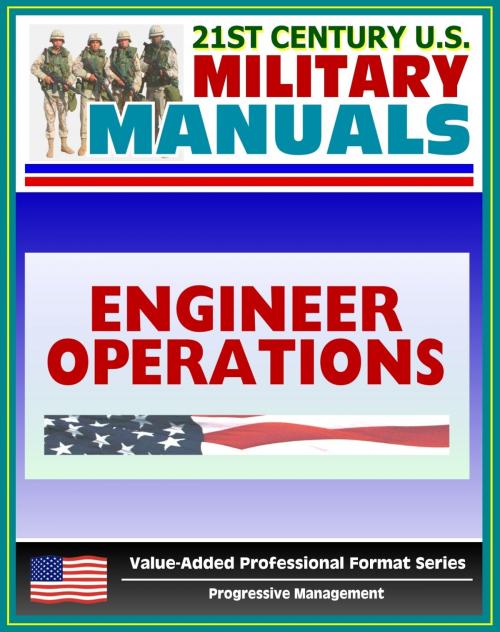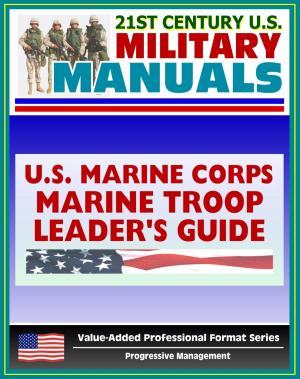21st Century U.S. Military Manuals: Engineer Operations: Echelons Above Corps - FM 5-116 (Value-Added Professional Format Series)
Nonfiction, History, Military| Author: | Progressive Management | ISBN: | 9781466162365 |
| Publisher: | Progressive Management | Publication: | September 13, 2011 |
| Imprint: | Smashwords Edition | Language: | English |
| Author: | Progressive Management |
| ISBN: | 9781466162365 |
| Publisher: | Progressive Management |
| Publication: | September 13, 2011 |
| Imprint: | Smashwords Edition |
| Language: | English |
Part of our value-added professional format series, the Engineer Operations: Echelons Above Corps Field Manual (FM 5-116) provides doctrine to commanders and staffs concerning the employment of engineer units at echelons above corps (EAC). These units will be required to complement or expand the combat capabilities of divisional engineer assets as well as construct, maintain, and rehabilitate the logistics infrastructure needed for operational sustainment of the combat forces. Some EAC engineer units may operate as far forward as the brigade's rear area, but generally most will operate in the communications zone (COMMZ).
The EAC engineer structure varies depending on the size of the combat force being supported, the type of action undertaken (offense, defense, stability, and support), the maturity of the theater, the availability of host-nation support (HNS), and the intensity of the conflict. Engineer EAC missions change as the theater expands and must be accomplished in nuclear, biological, chemical (NBC) and electronic warfare environments.
This manual addresses specific actions EAC engineer units must plan and conduct. The doctrine presented is applicable to combined, joint, and contingency operations.
The proponent for this publication is HQ, TRADOC.
This FM has been converted for accurate flowing-text e-book format reproduction.
As a bonus, this reproduction includes FM-1, The Army Field Manual, a capstone manual containing the vision for the Army - sold separately for $5.99. FM 1 establishes the fundamental principles for employing Landpower. The most important of these are the Army's operational concept and the fundamentals that support it. They form the foundation for all Army doctrine. All Soldiers should understand and internalize them. FM 1 describes the American profession of arms, the Army's place in it, and what it means to be a professional Soldier.
This is a privately authored news service and educational publication of Progressive Management.
Part of our value-added professional format series, the Engineer Operations: Echelons Above Corps Field Manual (FM 5-116) provides doctrine to commanders and staffs concerning the employment of engineer units at echelons above corps (EAC). These units will be required to complement or expand the combat capabilities of divisional engineer assets as well as construct, maintain, and rehabilitate the logistics infrastructure needed for operational sustainment of the combat forces. Some EAC engineer units may operate as far forward as the brigade's rear area, but generally most will operate in the communications zone (COMMZ).
The EAC engineer structure varies depending on the size of the combat force being supported, the type of action undertaken (offense, defense, stability, and support), the maturity of the theater, the availability of host-nation support (HNS), and the intensity of the conflict. Engineer EAC missions change as the theater expands and must be accomplished in nuclear, biological, chemical (NBC) and electronic warfare environments.
This manual addresses specific actions EAC engineer units must plan and conduct. The doctrine presented is applicable to combined, joint, and contingency operations.
The proponent for this publication is HQ, TRADOC.
This FM has been converted for accurate flowing-text e-book format reproduction.
As a bonus, this reproduction includes FM-1, The Army Field Manual, a capstone manual containing the vision for the Army - sold separately for $5.99. FM 1 establishes the fundamental principles for employing Landpower. The most important of these are the Army's operational concept and the fundamentals that support it. They form the foundation for all Army doctrine. All Soldiers should understand and internalize them. FM 1 describes the American profession of arms, the Army's place in it, and what it means to be a professional Soldier.
This is a privately authored news service and educational publication of Progressive Management.















